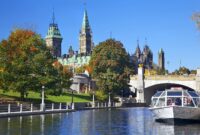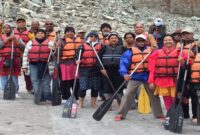Small group tours for seniors offer a unique blend of adventure and relaxation, catering to the specific needs and interests of mature travelers. These curated experiences prioritize comfort, accessibility, and engaging activities, ensuring a memorable and enriching journey. Whether it’s exploring historical landmarks, immersing oneself in vibrant cultures, or simply enjoying breathtaking scenery, these tours provide a carefully planned itinerary designed for a stress-free and enjoyable vacation.
This exploration delves into the key aspects of designing and marketing successful small group tours for seniors, covering destination suitability, itinerary planning, transportation and accommodation choices, health and safety protocols, and effective marketing strategies. The aim is to provide a comprehensive guide for tour operators seeking to create exceptional travel experiences for this discerning demographic.
Tour Activities & Itinerary Design
Crafting engaging and appropriate itineraries is paramount for successful senior group tours. The key is to balance enriching experiences with ample opportunities for rest and relaxation, catering to the diverse needs and physical capabilities of the participants. Careful consideration of pacing, activity levels, and the inclusion of flexible scheduling are crucial elements in creating a memorable and enjoyable experience for all.
Itinerary design for senior tours requires a nuanced approach. It’s not simply about ticking off sightseeing locations; it’s about creating a holistic travel experience that prioritizes comfort, enjoyment, and the well-being of the participants. The following examples illustrate how varying paces and activity levels can be incorporated into daily itineraries.
Example Daily Itineraries for Senior Tours
Below are three sample daily itineraries, each designed with a different pace and activity level in mind: relaxed, moderate, and active. These examples are illustrative and can be adapted based on the specific interests and capabilities of the group.
- Relaxed Pace Itinerary:
- Morning: Gentle stroll through a botanical garden with ample seating areas and opportunities for leisurely observation.
- Afternoon: Relaxing afternoon tea at a charming café, followed by a guided tour of a local art gallery at a comfortable pace.
- Evening: Light dinner at a restaurant with comfortable seating and a relaxed atmosphere.
- Moderate Pace Itinerary:
- Morning: Guided walking tour of a historical district, incorporating several rest stops at cafes or benches.
- Afternoon: Visit to a local museum with comfortable seating areas and opportunities to take breaks. A short, scenic bus ride to the next location.
- Evening: Dinner at a restaurant followed by a leisurely evening stroll along a waterfront promenade.
- Active Pace Itinerary (with built-in flexibility):
- Morning: Guided hike on a relatively easy trail with breathtaking views, including several rest stops. Alternative: Participants can opt for a scenic drive to the same viewpoint.
- Afternoon: Visit to a local market, followed by a cooking class focusing on regional cuisine (optional participation).
- Evening: Dinner at a restaurant, followed by optional participation in a local cultural performance.
The Importance of Rest Periods and Flexible Scheduling
Incorporating rest periods and flexible scheduling is crucial for senior tours. Senior travelers may have varying levels of stamina and mobility, and unexpected events can arise. Rest periods allow participants to recharge, preventing fatigue and ensuring everyone enjoys the experience. Flexible scheduling provides contingency plans and allows for adjustments based on the group’s needs and preferences. For example, a planned walking tour could be adjusted to include more frequent stops or alternative transportation options if needed. A rain shower might necessitate a change of plans, leading to a visit to a museum instead of an outdoor activity. This adaptability ensures a smooth and enjoyable journey for everyone.
Sample Balanced Itinerary
This sample itinerary demonstrates a balance of cultural, historical, and recreational activities, with built-in flexibility and rest periods.
- Day 1: Arrival and City Exploration
- Afternoon: Check-in to hotel, followed by a relaxed afternoon tea at the hotel.
- Evening: Welcome dinner at a local restaurant with traditional cuisine.
- Day 2: Historical Immersion
- Morning: Guided walking tour of the historical city center (with multiple rest stops).
- Afternoon: Visit to a significant historical landmark, with ample time for exploration and relaxation.
- Evening: Free time for personal exploration or relaxation.
- Day 3: Cultural Enrichment and Recreation
- Morning: Visit to a local museum or art gallery.
- Afternoon: Scenic boat tour or leisurely walk along a river/lake (alternative: visit to a local park with comfortable seating areas).
- Evening: Farewell dinner with live music.
Health & Safety Considerations
The well-being of our senior travelers is paramount. This section outlines the potential health concerns inherent in group travel for seniors and details the preventative measures and emergency protocols we implement to ensure a safe and enjoyable experience. Our commitment to proactive safety planning minimizes risks and provides peace of mind for both participants and their families.
Prioritizing the health and safety of senior travelers requires a multifaceted approach. Understanding common health risks associated with travel and implementing effective preventative measures is crucial. Equally important are comprehensive emergency protocols and readily available travel insurance.
Potential Health Concerns and Preventative Measures
Senior travelers are susceptible to a range of health issues exacerbated by travel. These include cardiovascular problems, respiratory illnesses, falls, and medication complications. To mitigate these risks, we implement several preventative measures. These measures aim to proactively address potential health challenges, ensuring a comfortable and secure journey for all participants.
- Pre-Trip Health Check-ups: We strongly encourage all participants to consult their physicians before the tour to discuss any pre-existing conditions and obtain necessary medical clearance and updated vaccinations.
- Medication Management: A clear and comprehensive medication schedule is vital. Participants are asked to bring sufficient medication, clearly labeled, and easily accessible. We provide assistance with medication reminders and storage.
- Accessibility Considerations: Tour itineraries are designed with accessibility in mind, minimizing strenuous activities and incorporating ample rest periods. We accommodate varying mobility levels, ensuring comfortable participation for everyone.
- Hydration and Nutrition: We emphasize the importance of proper hydration and nutrition throughout the trip. We provide regular access to water and offer nutritious meals or snacks to maintain energy levels and prevent dehydration.
- First Aid and Medical Supplies: A well-stocked first-aid kit is carried on all tours, and our tour guides receive basic first-aid training. We also establish a readily accessible contact list of local medical facilities.
Emergency Medical Protocols
In the event of a medical emergency, a swift and coordinated response is crucial. Our emergency protocols are designed to provide immediate assistance and minimize potential complications. Clear communication and established procedures are key to ensuring efficient handling of any medical situation.
- Immediate Response Team: Designated tour guides are trained to recognize and respond to medical emergencies. They are equipped with communication devices to contact emergency services and designated medical personnel.
- Emergency Contact Information: We maintain a readily accessible list of emergency contacts, including family members, physicians, and local medical facilities.
- Transportation Arrangements: We have established procedures for arranging immediate transportation to the nearest medical facility, including ambulance services where necessary.
- On-site Medical Assistance: For longer tours, we explore options for on-site medical professionals or readily available telehealth services to provide immediate consultations.
- Post-Emergency Support: Following a medical emergency, we provide ongoing support to the affected individual and their family, including coordinating with medical facilities and assisting with travel arrangements.
Importance of Travel Insurance and Essential Coverage
Comprehensive travel insurance is not just recommended; it’s essential for senior travelers. Unexpected medical emergencies, trip cancellations, or lost luggage can be financially devastating. A well-structured policy provides financial protection and peace of mind.
Travel insurance should include several key elements:
- Medical Emergency Coverage: This should cover emergency medical treatment, hospitalization, and medical evacuation, including repatriation if necessary. Coverage should extend beyond basic first aid.
- Trip Cancellation/Interruption Insurance: This covers unexpected events such as illness, injury, or family emergencies that necessitate canceling or interrupting a trip, providing reimbursement for non-refundable expenses.
- Emergency Medical Evacuation: This is crucial, particularly for seniors with pre-existing conditions, covering the cost of transporting someone needing urgent medical care to an appropriate facility.
- Baggage Loss/Delay Coverage: This protects against the loss or delay of luggage, reimbursing for essential items and covering replacement costs.
- Personal Liability Coverage: This protects against claims of accidental injury or damage to property caused by the insured individual.
Conclusive Thoughts
Ultimately, the success of small group tours for seniors hinges on a meticulous attention to detail, prioritizing the comfort, safety, and enjoyment of the participants. By carefully selecting destinations, designing thoughtful itineraries, providing appropriate transportation and accommodation, and implementing robust health and safety measures, tour operators can craft unforgettable journeys that cater specifically to the needs and preferences of senior travelers. Effective marketing strategies are also crucial in reaching this target audience and showcasing the unique value proposition of these specialized tours.




